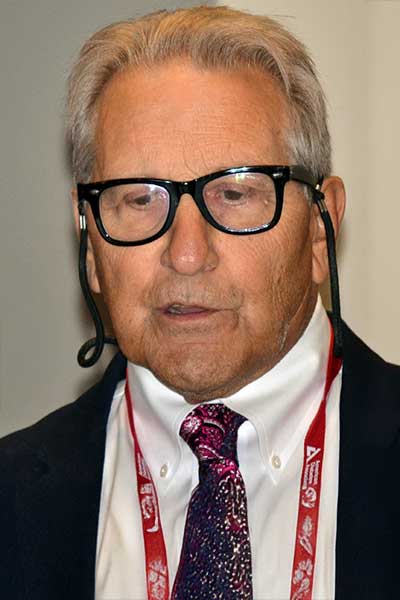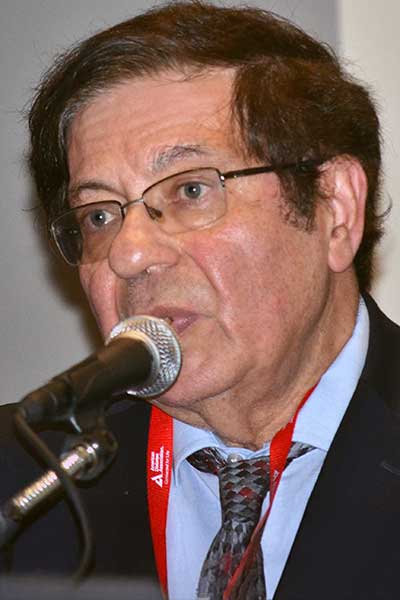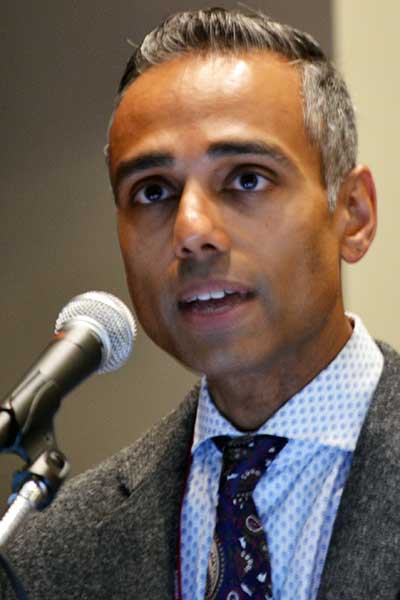A group of experts explored differences between type 1 and type 2 diabetes in respect to cardiovascular and kidney complications, then interpreted what this means for future research and ongoing clinical care, during the symposium, Cardiovascular Complications of Long-Term Diabetes—Type 1 vs. Type 2, on Monday, June 23, at the 85th Scientific Sessions.
Trials, Data, and Practice

“For many years, I’ve had the question: ‘Is the pathophysiology of atherosclerotic cardiovascular disease (ASCVD) the same in patients living with type 1 diabetes and type 2 diabetes?’” said Robert H. Eckel, MD, Professor Emeritus, University of Colorado Anschutz Medical Campus. “My hypothesis is that it is not, and that we’ve had real problems analyzing data in this space.”
To underline these challenges, Dr. Eckel provided an overview of literature and standard practice of known factors in cardiovascular complications for people living with type 2 diabetes: glycemia, high blood pressure, high sodium, thrombosis, obesity, and more.
In comparison, Dr. Eckel noted, there has been much less research focused on type 1 diabetes. Furthermore, some historic literature has been muddied by grouping both types of diabetes together, as well as from difficulty in age and disease-duration comparisons.
Dr. Eckel said some aspects of diabetes, such as the effect of glycemic rates, make it potentially dangerous to involve people living with type 1 diabetes in randomized controlled trials (RCTs). Because of this concern—and because of the compelling evidence—standards for treating glycemic rates should continue to borrow heavily from type 2 diabetes studies. But there are also possibilities for safe and informative RCTs to help illuminate the difference in type 1 and type 2 diabetes, he noted.
The CaRe-T1D Program

Silvio Litovsky, MD, Professor, University of Alabama, Birmingham, serves as one of the three co-principal investigators for the Cardiovascular Biorepository for Type 1 Diabetes (CaRe-T1D) Program, which seeks to address the deficit of knowledge about cardiovascular disease in type 1 diabetes by maintaining a research-accessible cardiac tissue biorepository containing tissue from donor groups representing people who lived with type 1 diabetes and type 2 diabetes, as well as those who lived without diabetes.
Studies using the repository samples have shown average differences in heart weight between type 1 and type 2 diabetes groups, increased presence of epicardial fat tissue in children living with type 1 diabetes (in comparison to children without diabetes), and the relationship between epicardial adipose tissue (EAT), pericardial adipose tissue (PAT), and hearts from subjects who had type 2 diabetes.
Dr. Litovsky said that results such as this, plus a “commendable spirit of collaboration” among CaRe-T1D teams that have already received samples, can help the biorepository fulfill its aim to serve as a coordinating center to distribute samples to qualified investigators, integrate multi-modal data in a centralized database, and promote collaborative research.
The Difference in CKD

Anand Srivastava, MD, MPH, Associate Professor at the University of Illinois at Chicago, summarized overlaps, key differences, and unknowns in a comparison of kidney function and chronic kidney disease (CKD) between people with type 1 diabetes and type 2 diabetes.
Dr. Srivastava noted the two types of diabetes share a pathogenesis, and that some subtle kidney hemodynamic differences might be attributable to individual age, disease duration, or metabolic factors.
However, Dr. Srivastava outlined notable differences.
Youth living with type 2 diabetes generally have more worrisome signs of hyperfiltration early in the course of the disease. Also, a 2024 study revealed that kidney MRI-derived hemodynamics appeared worse among those living with type 1 diabetes.
Dr. Srivastava said further studies in molecular characterizations, as well as ongoing proteomic and metabolomic profiling, may help characterize type 1 and type 2 diabetes differences.
Looking to future research, Dr. Srivastava also suggested that it would be productive to conduct close examinations of individuals with type 1 or type 2 whose bodies have shown a resistance to CKD.
On-demand access to recorded presentations from this session will be available to registered participants of the 85th Scientific Sessions through August 25.

Watch the Scientific Sessions On-Demand after the Meeting
Extend your learning on the latest advances in diabetes research, prevention, and care after the 85th Scientific Sessions conclude. From June 25–August 25, registered participants will have on-demand access to presentations recorded in Chicago via the meeting website.

